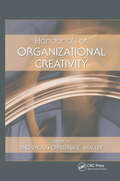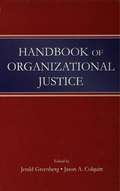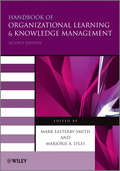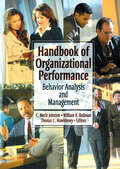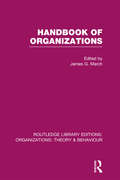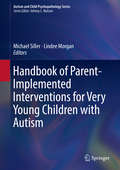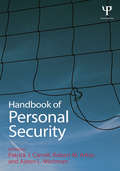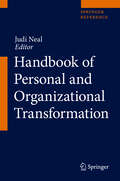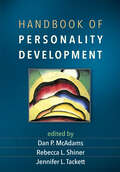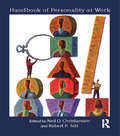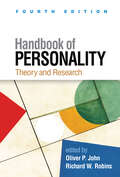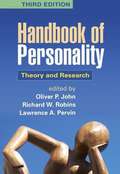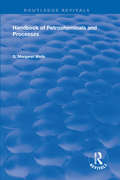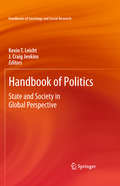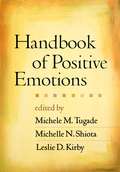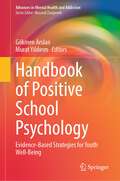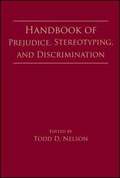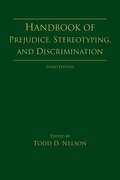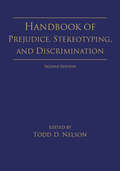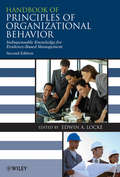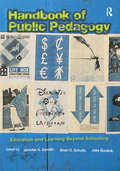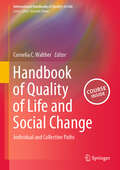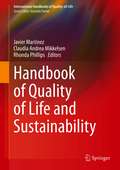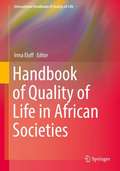- Table View
- List View
Handbook of Organizational Creativity
by Jing Zhou Christina E. ShalleyThis volume is a comprehensive and cutting-edge reference book reflecting current knowledge in the rapidly growing area of organizational creativity. The contributors to this volume are all leading researchers in the field of organizational creativity. This volume: provides a historical review of organizational creativity theory and research presents critical reviews and summaries of research on micro, meso, and macro topics (e.g., leadership, feedback, goals and role expectations, groups and teams, social networks, climate and culture, deep structures, sense-making processes, and creativity and organizational change) concerning organizational creativity demonstrates contributions of creativity to individual work outcomes and organizational success discusses emerging areas and highlights promising future research trends. Professors and graduate students in management and psychology will find this volume most beneficial. Professors and graduate students in marketing, sociology, and education also may find this book useful and relevant. Thoughtful managers and executives, professionals and knowledge workers, and aspiring managers and MBA students also would find this book beneficial in sharpening their thinking, and helping them to identify the right tools for managing creativity.
Handbook of Organizational Justice
by Jason A. Colquitt Jerald GreenbergMatters of perceived fairness and justice run deep in the workplace. Workers are concerned about being treated fairly by their supervisors; managers generally are interested in treating their direct reports fairly; and everyone is concerned about what happens when these expectations are violated. This exciting new handbook covers the topic of organizational justice, defined as people's perceptions of fairness in organizations.The Handbook of Organizational Justice is designed to be a complete, current, and comprehensive reference chronicling the current state of the organizational justice literature. Tracing the development of ideas regarding organizational justice, this book:*introduces the topic of organizational justice from a historical perspective and presents fundamental issues regarding the nature of organizational justice;*examines the justice judgment process, specifically addressing basic psychological processes, such as the roles of control, self-interest, morality, and trust in the formation of justice judgments;*discusses the consequences of fair and unfair treatment in the workplace;*focuses on such key issues as promoting justice in the workplace in ways that help manage stress, and the underlying processes that account for the effectiveness of justice applications;*examines the generalizability of the interaction between process and outcomes and focuses on the notion of cross-cultural differences in justice effects; and*summarizes the state of the science of organizational justice and presents various issues for future research and theorizing.This Handbook is useful as a guide for professors and graduate students, primarily in the fields of management and psychology. It also is highly relevant to professionals in the fields of communication, sociology, legal studies, marketing, and human resources management.
Handbook of Organizational Learning and Knowledge Management
by Mark Easterby-Smith Marjorie A. LylesThe fully revised and updated version of this successful Handbook is welcomed by management scholars world-wide. By bringing together the latest approaches from the leading experts in organizational learning & knowledge management the volume provides a unique and valuable overview of current thinking about how organizations accumulate 'knowledge' and learn from experience.Key areas of update in the new edition are:Resource based view of the firmCapability managementGlobal managementOrganizational cultureMergers & acquisitionsStrategic managementLeadership
Handbook of Organizational Performance: Behavior Analysis and Management
by William K Redmon Thomas C Mawhinney Carl Merle JohnsonCapitalize on the principles of psychology to develop more effective leadership!Whether you work in a smokestack industry, the service sector, or a high-tech information-based business, the basic principles of industrial/organizational psychology you will find in The Handbook of Organizational Performance can help you obtain better performance from your employees. This comprehensive volume contains all the information you need to understand on-the-job behavior and effectively manage your employees. The Handbook of Organizational Performance gives you the tools and techniques you need to reward positive employee behaviors and correct undesirable ones before they become destructive habits. Using the principles of industrial/organizational psychology, you will learn how to train employees, how to determine criteria for performance appraisals, and how to establish leadership in the workplace.The Handbook of Organizational Performance is a comprehensive guide to all areas of management, including: designing more effective training managing occupational stress using ”pay-for-performance” plans reducing job-related injury and illness taking an active role in occupational safety encouraging business ethicsWith its clear structure and helpful charts, tables, and figures, The Handbook of Organizational Performance is an indispensable management tool and an essential text for students of business.
Handbook of Organizations: Organizations: Handbook Of Organizations (Routledge Library Editions: Organizations)
by James G. MarchThis book charts the state of organizational research and theory during the 1960s. A compendium of results, references, concepts ideas and theories, this Handbook will be of interest to both academics in organizational theory and managers facing operating problems of organizations.
Handbook of Parent-Implemented Interventions for Very Young Children with Autism (Autism and Child Psychopathology Series)
by Michael Siller Lindee MorganThis handbook offers practical strategies and evidence-based parent-implemented interventions for very young children with autism spectrum disorder (ASD). It explores this important subject within the context of rapidly increasing numbers of toddlers who are diagnosed with ASD during the second year of life. The handbook discusses how parents of young children with ASD can effectively be supported, taught, and coached to implement evidence-based parenting strategies and intervention techniques, and describes a broad range of developmentally appropriate programs at the family, community, and service delivery levels. In addition, the handbook examines individual differences in parenting cognitions, emotions, and practices and proposes strategies for supporting the varying capacities of diverse families to meet the needs of young children with ASD. Chapters provide diverse coverage, spanning cultural/socio-economic differences as well as differences in family structure; parenting cognitions, emotions, and practices; parental learning styles; and access to social support. Featured topics include: Supporting families of high-risk infants who have an older sibling with ASD.The use of video feedback strategies in parent-mediated early ASD intervention. The Incredible Years (IY) Parent Program for preschool children with ASD and language delays. Self-help for parents of children with ASD. The Family Implemented TEACCH for Toddlers (FITT) support model. Parent-implemented interventions for underserved families in Taiwan. Family and provider-based interventions in South Asia. The Handbook of Parent-Implemented Interventions for Very Young Children with Autism is a must-have resource for researchers, clinicians/professionals, and graduate students in clinical child, school, and developmental psychology, family studies, behavioral therapy, and social work as well as rehabilitation medicine/therapy, child and adolescent psychiatry, pediatrics, and special education/educational psychology.
Handbook of Personal Security
by Patrick J. Carroll Robert M. Arkin Aaron L. WichmanThe issue of psychological security within an increasingly unstable, interconnected world has become a defining challenge of modern individual and cultural life. The terror attacks of September 11, 2001 and the global financial crisis that unfolded in 2008 have intensified a sense of global and personal insecurity. This concern with psychological insecurity is reflected in contemporary culture, politics, the business world, consumer behavior, the arts, and other areas. Within this context, the psychological sciences have kept pace, vigorously investigating these issues. This handbook features the latest theory and research examining cognitive, emotional, and behavioral responses to security threats. It expands the conceptual focus from specific security threats to the broader range of antecedents, processes, and consequences of psychological security/insecurity. The chapters are organized into four content areas: personal security in individual contexts, personal security in interpersonal contexts, personal security with cultural and health contexts, and interdisciplinary analyses of personal security. They represent a new and vibrant area of research unified by the common goal of understanding the factors that shape a sense of personal security. Together, these provocative chapters provide specific starting points that will shape future theory, policy, and practice on this dominant social issue of the 21st Century and, more importantly, offer opportunities to connect social and personality psychology to its scientific kin.
Handbook of Personal and Organizational Transformation
by Judi NealThis handbook is based on the premise that there can be no organizational transformation without personal transformation. Anything else is just moving the chairs around on the deck of the Titanic, and we see that all too often in organizations today. Einstein said that we cannot solve problems from the same mindset that created the problems. In order to see positive change occur in the world, we must shift our consciousness to a high level of thinking and being, but we must also have systems or approaches that scale up, so that there is a collective shift in consciousness in groups, work teams, villages, governments, and corporations. This handbook aims to draw the best and most creative thinking about the field of transformation in one place, to present a comprehensive overview of leading edge transformation theories and approaches for both the academic and the practitioner. In fact, the lines between academic and practitioner are becoming more and more blurred these days. Many management faculty also consult to organizations, a practice that deeply enriches their teaching and research. And many successful full-time consultants conduct high quality research to support their approaches and change initiatives. This Handbook aims to be a creative dialogue in this space that integrates transformation theory and practice. The Handbook of Personal and Organizational Transformation acknowledges the classic literature and principles that have informed the field to date, but primarily showcases authors who are on the cutting edge of new theories and new approaches to give us their latest thinking. Some of these ideas are conjecture about what is possible in human and organizational development. Some of these approaches are currently being tested in the field and may not yet have scientific results. And some of these theories and models have stunning results, but may not have been published in academic journals because the author is a practitioner instead of an academic, or because the concepts are a little too far out of the mainstream. The aim of this book is to expand the reader’s thinking and to encourage readers to be courageous about their involvement in creating transformation, at whatever level they feel called to do so. It will serve as an essential resource for researchers and students of organizational culture, leadership, and change management, as well as consultants, business and team leaders, and anyone interested in global trends and their impact on corporate culture.
Handbook of Personality Development
by Rebecca L. Shiner Jennifer L. Tackett Dan P. McAdamsBringing together prominent scholars, this authoritative volume considers the development of personality at multiple levels--from the neuroscience of dispositional traits to the cultural shaping of life stories. Illustrated with case studies and concrete examples, the Handbook integrates areas of research that have often remained disparate. It offers a lifespan perspective on the many factors that influence each individual's psychological makeup and examines the interface of personality development with health, psychopathology, relationships, and the family. Contributors provide broad-based, up-to-date reviews of theories, empirical findings, methodological innovations, and emerging trends. See also the authored volume The Art and Science of Personality Development, by Dan P. McAdams.
Handbook of Personality at Work (Applied Psychology Series)
by Neil Christiansen Robert TettPersonality has emerged as a key factor when trying to understand why people think, feel, and behave the way they do at work. Recent research has linked personality to important aspects of work such as job performance, employee attitudes, leadership, teamwork, stress, and turnover. This handbook brings together into a single volume the diverse areas of work psychology where personality constructs have been applied and investigated, providing expert review and analysis based on the latest advances in the field.
Handbook of Personality, Fourth Edition: Theory and Research
by Oliver P. John Richard W. RobinsNow in a revised and expanded fourth edition, this definitive reference and text has more than 50% new material, reflecting a decade of theoretical and empirical advances. Prominent researchers describe major theories and review cutting-edge findings. The volume explores how personality emerges from and interacts with biological, developmental, cognitive, affective, and social processes, and the implications for well-being and health. Innovative research programs and methods are presented throughout. The concluding section showcases emerging issues and new directions in the field. New to This Edition *Expanded coverage of personality development, with chapters on the overall life course, middle childhood, adolescence, and early adulthood. *Three new chapters on affective processes, plus chapters on neurobiology, achievement motivation, cognitive approaches, narcissism, and other new topics. *Section on cutting-edge issues: personality interventions, personality manifestations in everyday life, geographical variation in personality, self-knowledge, and the links between personality and economics. *Added breadth and accessibility--42 more concise chapters, compared to 32 in the prior edition.
Handbook of Personality, Third Edition
by Richard Robins Oliver JohnThis authoritative handbook is the reference of choice for researchers and students of personality. Leading authorities describe the most important theoretical approaches in personality and review the state of the science in five broad content areas biological bases; development; self and social processes; cognitive and motivational processes; and emotion, adjustment, and health. Within each area, chapters present innovative ideas, findings, research designs, and measurement approaches. Areas of integration and consensus are discussed, as are key questions and controversies still facing the field.
Handbook of Petrochemicals and Processes (Routledge Revivals)
by G. Margaret WellsFirst published in 1991, this volume responds to the major changes in the petrochemical industry over the previous decade due to increases in raw material costs, improvements in process efficiency and the increasing importance now being placed on environmental issues. The Handbook of Petrochemicals and Processes provides comprehensive, up to date information on 76 petrochemicals and their processes, giving details of the chemical reactions involved in transforming raw materials, such as olefins and aromatics, into chemicals, plastics and synthetic fibres. The competing processes for each product including the latest technical developments are described, with their feedstock requirements, catalysts and conversion rates compared. Many of the processes are illustrated with clear flow diagrams. The book is easy to use with the products arranged in alphabetical order. Within each chapter on the individual products there are details of the physical characteristics and properties; grades available; handling; transportation; health and safety aspects and lists of the major manufacturers and licensors The Handbook of Petrochemicals and Processes gathers together in one volume, all the commonly sought chemical information. It will prove an invaluable source of reference for industrial chemists, chemical engineers, and industry professionals, as well as librarians and information centres concerned with the petrochemical industry.
Handbook of Political Islam in Europe: Activities, Means, and Strategies from Salafists to the Muslim Brotherhood and Beyond (Springer Handbooks of Political Science and International Relations)
by Thomas Jäger Ralph ThieleThis book approaches the field of Political Islam from a European security perspective. Featuring various case studies and country surveys written by respected experts in the field, it offers a comparative perspective and comprehensive overview of the ideology and prevalence of Political Islam and its actors in more than 20 European states. The respective contributions identify key actors of Political Islam and reveal the activities, means, and strategies they pursue and employ across the continent. They also discuss if and how Political Islam could undermine the Western liberal democratic order and its associated values. By doing so, the volume offers approaches to analyzing Political Islam and thereby strengthening the resilience of liberal democratic societies, while also protecting Muslims from the radical ideology and agenda of Political Islam.Chapter - "Hybridizing Islam in the Balkans: The Rise of Salafi-Hanafism in Bulgaria" is licensed under the terms of the Creative Commons Attribution 4.0 International License (http://creativecommons.org/licenses/by/4.0/). For further details see license information in the chapter.
Handbook of Politics
by J. Craig Jenkins Kevin T. LeichtPolitical sociology is the interdisciplinary study of power and the intersection of personality, society and politics. The field also examines how the political process is affected by major social trends as well as exploring how social policies are altered by various social forces. Political sociologists increasingly use a wide variety of relatively new quantitative and qualitative methodologies and incorporate theories and research from other social science cognate disciplines. The contributors focus on the current controversies and disagreements surrounding the use of different methodologies for the study of politics and society, and discussions of specific applications found in the widely scattered literature where substantive research in the field is published. This approach will solidly place the handbook in a market niche that is not occupied by the current volumes while also covering many of the same theoretical and historical developments that the other volumes cover. The purpose of this handbook is to summarize state-of-the-art theory, research, and methods used in the study of politics and society. This area of research encompasses a wide variety of perspectives and methods that span social science disciplines. The handbook is designed to reflect that diversity in content, method and focus. In addition, it will cover developments in the developed and underdeveloped worlds.
Handbook of Positive Emotions
by Barbara L. Fredrickson Michele M. Tugade Leslie D. Kirby Michelle N. ShiotaThis authoritative handbook reviews the breadth of current knowledge about positive emotions: their nature, functions, and consequences for individuals and society. Specific emotions are analyzed in depth, including happiness, pride, romantic love, compassion, gratitude, awe, challenge, and hope. Major theoretical perspectives are presented and cutting-edge research methods explained. The volume addresses neurobiological and physiological aspects of positive emotions as well as their social and intrapersonal contexts. Implications for physical health, coping, and psychopathology are explored, as are connections to organizational functioning and consumer behavior.
Handbook of Positive School Psychology: Evidence-Based Strategies for Youth Well-Being (Advances in Mental Health and Addiction)
by Gökmen Arslan Murat YıldırımStudents spend significantly more time in school compared to any other formal institution during their lives; therefore, mental health in schools has attracted a lot of attention in recent years. According to Seligman et al. (2009), positive psychology in school is a response to the gap between what people want for their children and what schools teach. That is, most parents want their children to be happy, healthy, and confident, but schools only focus on achievement, discipline, and academic skills. These are of course important, but so are positive mental health outcomes. To fix this gap, schools must teach achievement and accomplishment along with positive psychology-informed mental health skills. In other words, positive education aims to bring positive psychology’s goals of well-being and mental health support for everyone into the school setting.Psychological interventions have been around in schools since at least the 1930s. Therefore, it makes sense to supplement the already-existing traditional psychology in schools with positive psychology. In the field of psychology, positive psychology interventions are defined as those aimed at raising positive feelings, positive thoughts, and positive behaviour and increasing well-being. Positive Psychology Interventions in schools have been shown to improve mental health and well-being outcomes for students. Recent research has confirmed the same results, as offering emotional support early in a school year can lead to improved instructional quality later in that school year. In other words, positive school psychology interventions offer a focus on mental health in order to set the stage and give students the opportunity for academic achievement. Since the beginning of the positive psychology movement, the application of its assumptions in schools has been one of the movement’s main pillars. The objective of the book is to help counsellors, teachers, and school leaders engage in a positive psychology research-based practice in schools.
Handbook of Prejudice, Stereotyping, and Discrimination
by Todd D. NelsonThis handbook provides a comprehensive and scholarly overview of the latest research on prejudice, stereotyping and discrimination. It includes sections on cognitive, affective, and neurological processes, followed by chapters on some of the main target groups of prejudice.
Handbook of Prejudice, Stereotyping, and Discrimination
by Todd D. NelsonThis new edition of this bestselling handbook offers a comprehensive and scholarly overview of the latest research on prejudice, stereotyping, and discrimination.Now in its third edition, the book provides a full update of its highly successful predecessor and features new material on topics such as antisemitism, mental illness stigma, sexual and gender identity prejudice, anti-fat prejudice, politics and prejudice, ableism, evolutionary theory and prejudice, and anti-immigration prejudice. The book is divided into four main parts that consider the origins of prejudice; cognitive, affective, and motivational processes in prejudice; targets of prejudice and reducing prejudice. The volume is written by eminent researchers who explore topics by presenting an overview of current and cutting-edge research and, where appropriate, developing new theory, models, or scales.Handbook of Prejudice, Stereotyping, and Discrimination is an essential text for graduate students, instructors and researchers in social and personality psychology. It is also an invaluable reference for academics and professionals in sociology, communication studies and the social sciences, as well as government workers and policymakers.
Handbook of Prejudice, Stereotyping, and Discrimination: 2nd Edition
by Todd D. NelsonThis Handbook is a comprehensive and scholarly overview of the latest research on prejudice, stereotyping, and discrimination. The Second Edition provides a full update of its highly successful predecessor and features new material on key issues such as political activism, economic polarization, minority stress, same-sex marriage laws, dehumanization, and mental health stigma, in addition to a timely update on how victims respond to discrimination, and additional coverage of gender and race. All chapters are written by eminent researchers who explore topics by presenting an overview of current research and, where appropriate, developing new theory, models, or scales. The volume is clearly structured, with a broad section on cognitive, affective, and neurological processes, and there is inclusion of studies of prejudice based on race, sex, age, sexual orientation, and weight. A concluding section explores the issues involved in reducing prejudice. The Handbook is an essential resource for students, instructors, and researchers in social and personality psychology, and an invaluable reference for academics and professionals in sociology, communication studies, gerontology, nursing, medicine, as well as government and policymakers and social service agencies.
Handbook of Principles of Organizational Behavior
by Edwin LockeThere is a strong movement today in management to encourage management practices based on research evidence. In the first volume of this handbook, I asked experts in 39 areas of management to identify a central principle that summarized and integrated the core findings from their specialty area and then to explain this principle and give real business examples of the principle in action. I asked them to write in non-technical terms, e.g., without a lot of statistics, and almost all did so.The previous handbook proved to be quite popular, so I was asked to edit a second edition. This new edition has been expanded to 33 topics, and there are some new authors for the previously included topics. The new edition also includes: updated case examples, updated references and practical exercises at the end of each chapter. It also includes a preface on evidence-based management. The principles for the first edition were intended to be relatively timeless, so it is no surprise that most of the principles are the same (though some chapter titles include more than one principle).This book could serve as a textbook in advanced undergraduate and in MBA courses. It could also be of use to practicing managers and not just those in Human Resource departments. Every practicing manager may not want to read the whole book, but I am willing to guarantee that every one will find at least one or more chapters that will be practically useful. In this time of economic crisis, the need for effective management practices is more acute than ever.
Handbook of Public Pedagogy: Education and Learning Beyond Schooling (Studies in Curriculum Theory Series)
by Jennifer A. Sandlin Jake Burdick Brian D. SchultzBringing together scholars, public intellectuals, and activists from across the field of education, the Handbook of Public Pedagogy explores and maps the terrain of this burgeoning field. For the first time in one comprehensive volume, readers will be able to learn about the history and scope of the concept and practices of public pedagogy. What is 'public pedagogy'? What theories, research, aims, and values inform it? What does it look like in practice? Offering a wide range of differing, even diverging, perspectives on how the 'public' might operate as a pedagogical agent, this Handbook provides new ways of understanding educational practice, both within and without schools. It implores teachers, researchers, and theorists to reconsider their foundational understanding of what counts as pedagogy and of how and where the process of education occurs. The questions it raises and the critical analyses they require provide curriculum and educational workers and scholars at large with new ways of understanding educational practice, both within and without schools.
Handbook of Quality of Life and Social Change: Individual and Collective Paths (International Handbooks of Quality-of-Life)
by Cornelia C. WaltherThis handbook provides an extensive overview of the links between quality of life and social change as pursued in not only humanitarian and development work, but also in the private sector and academia. It combines theoretical and practice-focused chapters and addresses socio-economic, environmental, and political/governance aspects as well as communication and human behavioural factors that favour or hamper social change dynamics. The handbook showcases vast diversity both in the authorship—which includes practitioners from a wide range of sectors and academics from various disciplines—as well in geographical contexts and regions. The chapters cover a wide range methods and tools, which facilitate an inclusive understanding of the relationship between quality of life and social change. They show connections between micro (individual) changes and the dynamics that derive from them at the meso (community), macro (country) and meta levels (planet) of quality of life, and the social change processes sustained through time. The chapters demonstrate that quality of life and social change mutually condition and nurture each other. The handbook overall provides a holistic perspective to social change processes that includes both material and non-material aspects relating to quality of life. This comprehensive and one-of-a-kind volume is of interest to a wide readership, from students and researchers of social development, quality of life and wellbeing research, to development workers, policy makers and other government officials. The handbook is bundled with an interactive online course.
Handbook of Quality of Life and Sustainability (International Handbooks of Quality-of-Life)
by Rhonda Phillips Javier Martinez Claudia Andrea MikkelsenThis handbook provides the latest research related to quality of life and sustainability, taking into account social, economic, environmental, and political/governance aspects as well as specific socio-spatial contexts. The volume includes contributions from established and upcoming scholars from various disciplines and geographical contexts (Global South and North). The varying cultural and socio-spatial contexts of the authors in the selected cases contribute to first-hand knowledge on the realities of sustainability issues affecting the quality of life. The authors apply a wide diversity of methods and tools, which facilitates a unique understanding of the interlinkages between quality of life and sustainability. The chapters are grouped in three main sections: concepts and foundations; tools, techniques, and applications; and innovations. The authors provide their own view and theoretical approximation of the dimensions of sustainability, in particular on how these dimensions play out in relation to quality of life. The combination of sustainability and quality of life concepts and perspectives is particularly important in unravelling the multi-faceted nature of human, urban, rural/spatial development.
Handbook of Quality of Life in African Societies (International Handbooks of Quality-of-Life)
by Irma EloffThis handbook reflects on quality-of-life in societies on the continent of Africa. It provides a widely interdisciplinary text with insights on quality-of-life from a variety of scientific perspectives. The handbook is structured into sections covering themes of social context, culture and community; the environment and technology; health; education; and family. It is aimed at scholars who are working towards sustainable development at the intersections of multiple scientific fields and it provides measures of both objective and subjective quality-of-life. The scholarly contributions in the text are based on original research and it spans fields of research such as cultures of positivity, wellbeing, literacy and multilinguism, digital and mobile technologies, economic growth, food and nutrition, health promotion, community development, teacher education and family life. Some chapters take a broad approach and report on research findings involving thousands, and in one case millions, of participants. Other chapters zoom in and illustrate the importance of specificity in quality-of-life studies. Collectively, the handbook illuminates the particularity of quality-of-life in Africa, the unique contextual challenges and the resourcefulness with which challenges are being mediated. This handbook provides empirically grounded conceptualizations about life in Africa that also encapsulate the dynamic, ingenious ways in which we, as Africans, enhance our quality-of-life.
